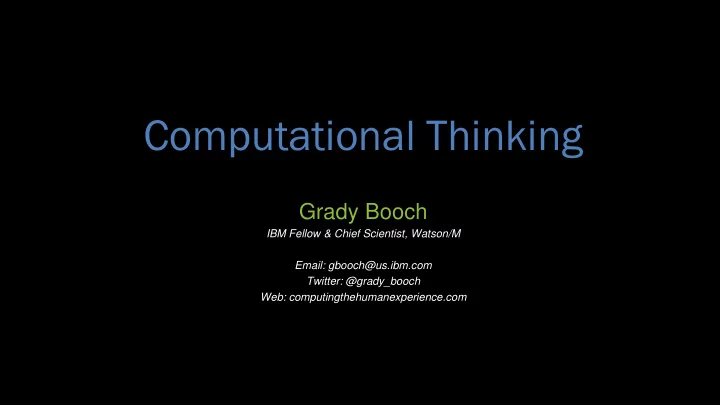

Computational Thinking Grady Booch IBM Fellow & Chief Scientist, Watson/M Email: gbooch@us.ibm.com Twitter: @grady_booch Web: computingthehumanexperience.com
ACM Highlights • Learning Center tools for professional development: http: / / learning.acm.org 4,000+ trusted technical books and videos by O ’ Reilly, Morgan Kaufm ann , etc. • • 1,000+ courses, virtual labs, test preps, live mentoring for software professionals covering programming, data management, cybersecurity, networking, project management, more • Training toward top vendor certifications (CEH, Cisco, CISSP, CompTIA, ITIL, PMI, etc.) • Learning Webinars from thought leaders and top practitioner • Podcast interviews with innovators, entrepreneurs, and award winners • Popular publications: • Flagship Communications of the ACM ( CACM) magazine: http: / / cacm.acm.org/ • ACM Queue magazine for practitioners: http: / / queue.acm.org/ • ACM Digital Library , the world’s most comprehensive database of computing literature: http: / / dl.acm.org • International conferences that draw leading experts on a broad spectrum of computing topics: http: / / www.acm.org/ conferences • Prestigious awards, including the ACM A.M. Turing and Infosys: http: / / awards.acm.org • And much more… http: / / www.acm.org
Computational Thinking Grady Booch IBM Fellow & Chief Scientist, Watson/M Email: gbooch@us.ibm.com Twitter: @grady_booch Web: computingthehumanexperience.com
7
8
9
10
11
12
13
14
15
16
17
18
19
20
21
22
23
Computational thinking is the thought processes involved in formulating problems and their solutions so that the solutions are represented in a form that can be effectively carried out by an information processing agent. Jeannette Wing 24
To flourish in today’s world, computational thinking has to be a fundamental part of the way people think and understand the world. CMU Center for Computational Thinking 25
26
27
28
29
30
31
32
33
34
35
36
37
38
39
40
41
42
Imagined Mathematical Symbolic Realities
The fundamental premise of science is that the cosmos is understandable; the fundamental premise of our domain is that the cosmos is computable.
45
46
47
48
An assumption that the cosmos is discrete
The foundational reality of information
Data as an abstraction of reality
The power of algorithms to form abstractions
The importance of scale
The universality of computing
Computational Computational Computational Computational Computational Computational … Physics Chemistry Biology Psychology Sociology Philosophy
The earliest ways of thinking evolved as a means of bringing more certainty and predictability to an uncertain and unpredictable world.
Scientific thinking evolved as a means of understanding the world.
Computational thinking has evolved as a means of controlling the world at a level of fidelity once relegated to the gods and goddesses of our myths.
Computational Thinking Grady Booch IBM Fellow & Chief Scientist for Software Engineering Email: gbooch@us.ibm.com Twitter: @grady_booch Web: computingthehumanexperience.com
ACM: The Learning Continues… • Questions about this webcast? learning@acm.org • ACM Learning Webinars (on-demand archive): http://learning.acm.org/webinar • ACM Learning Center: http://learning.acm.org • ACM SIGSOFT: http://sigsoft.org/ • ACM Queue: http://queue.acm.org
Recommend
More recommend